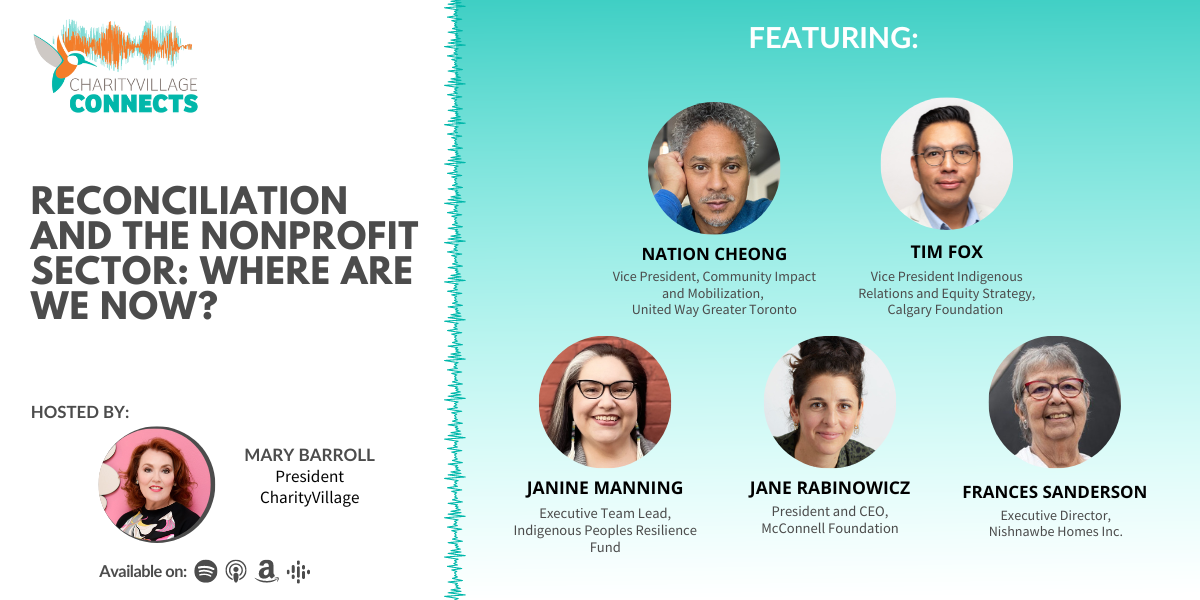How can the nonprofit sector better support, fund, and collaborate with Indigenous-led organizations and Indigenous communities? Our recent CharityVillage Connects podcast episode, Reconciliation and the Nonprofit Sector: Where Are We Now? explores possible answers to this important question.
As part of our discussions with Indigenous leaders, we spoke to Tim Fox, a member of the Blood Reserve and Vice President of Indigenous Relations and Equity Strategy for the Calgary Foundation. Tim generously shared with us his thoughts about this generational truth-telling moment that is upon us, why individuals shouldn’t aspire to be allies, and how nonprofit organizations, and the people working within them, can work toward reconciliation with Indigenous communities. Here’s a short excerpt of Tim’s full interview.
As we began the interview, Tim shared his perspectives on this “truth-telling” generational moment he sees us living in.
Tim Fox: So in the work that I do in the conversations that I’m trying to facilitate, I’m really trying to get people to think deeply about not only their roles as individuals and what they’re responsible for, but how they are a part of these larger systems and how they can really speak to some of that change.
A lady from the United States who does work in equity talks about this, that there’s this notion of being too woke. So when people are working towards equity, whether it’s racial equity, equity for other communities, definitely for reconciliation, when the perception or the optics are that people are having such a strong focus and they’re resourcing the work and they’re doing all of this change to the dominant culture and narrative, I think they’re a little bit threatened. It’s just like, what do we have to give up in order for this to happen?
And so there’s this phrasing of being too woke. And this lady in the States who does this work in equity, I really liked what she said. She said, we’re not becoming too woke as a society. As a society, we are maturing and we are realizing that there’s treatment towards specific groups of people that just isn’t tolerable anymore. And I like what you said about generational change because I absolutely agree with that. I think our generation right now is tasked with this truth-telling movement. And not only doing a Google search, not only doing that course that talks about Indigenous issues, but really understanding, doing some sense-making behind how that historical work has impacted our communities, how it still has socioeconomic challenges, and how we live in this world.
Tim went on to address the question of “what next” and why that question is problematic.
Tim Fox: Each and every time I do something or I hold space for that kind of learning and unlearning, people come up to me and they say, okay, Tim, you know, I finally get it. My knowledge has increased. I feel like I have the language to do something, but what do I do? What is next?
And I’ll say that that’s problematic for two reasons. The first reason is you’re putting that responsibility back on those who are already oppressed to tell you what to do. And secondly, if you can tell that person without a doubt in your mind that every single person within your spheres of influence, when it relates to your families, your friends, and your colleagues, has that same level of knowledge. And the answer is no. And that’s what’s next.
We have to really experience this truth telling movement. We are the generation tasked to set up the conditions and the knowledge and the understanding so that reconciliation can happen for this younger leadership. I do believe that a new kind of leadership is emerging in the younger generation, that they are not afraid to talk about this kind of stuff. And in fact, sometimes a lot of these movements that are going on, it’s coming from younger people. So I think we have a lot to learn from this younger generation, but that’s what we’re tasked to do.
In the past and moving forward and now, I always try to encourage people not to aspire to be an ally. That shouldn’t be your motivation. Your motivation should come from the fact and the realization that severe genocide has occurred, attempts at assimilation and oppression continues to happen today. And you’re inspired to right the wrongs of that past and change the trajectory in the future for the well-being of Indigenous people. It’s your actions that show your allyship status, not the fact that you want to be an ally. Allies are needed, but it’s this context that we want to really try to shift and change.
How can nonprofit organizations better move toward reconciliation? Tim Fox offered his thoughts.
Tim Fox: I would ask them not to stop talking. I would tell them to continue to talk about it.
I think when it comes to more action, I think if they can begin to really look at the structure of what makes them an organization, do a deep dive into their organizational script, there are opportunities. And when they look at these, when they look at this work, I don’t want them to be overwhelmed by, you know, they talk about the challenges. One of our brave space principles in our space is seeing those challenges as possibilities. How can they sort of shift the way they think about these challenges as actually possibilities? And once that happens, I think they will begin to see that that’s a leverage point for them to realize specific policy change that has to happen.
I think a big one is bereavement policy. I think we all have a bereavement policy, but are they considering a family concept when it comes to Indigenous people? Are they adjusting that bereavement policy so that our family goes beyond what the dominant culture would view as that nuclear family? We have traditional moms and dads and siblings who experience loss or we’re experiencing the loss of them, sometimes one after the other. And this bereavement policy wouldn’t support us taking the time off that we need to heal with our communities because it’s so specific on the relationship that you have to have with someone that you’ve lost. Things like that. That’s just one example of a structural policy that can change.
If organizations can have the bravery to, and I want to say this, a big level to an organization that can either hinder or support and move this work forward is that board of director level. And if that board of director level is not open to being a part of this work, if they aren’t understanding that it’s not easy to measure the success of a changing system by numbers or by surveys, and that’s all they’re used to seeing. They have so much power that they can, they have the ability to stop it. So it’s not just the organizations. It’s the leadership that has that big influence on these organizations as well.
Yes, it’s tough. Yes, it requires resourcing. But really, when it comes down to it, what is stopping you? What is stopping you is a question that I would encourage people to ask. And things are going to come up.
I’m afraid when they really dig deep down individually, they’ll surface some of the things that are really stopping them, that there’s a hesitation happening there. And the ability for them to overcome that by speaking to people who are experienced or doing this kind of work, I think will really benefit them. Find yourself in community.
So if there are non-Indigenous leaders who are part of the dominant culture, put yourself in places and spaces where you’re the minority. It’s the best way you’re going to learn. It’s the best way you’re going to continue to find yourself in those places and spaces to build relationships. When people struggle to pronounce the names of communities when it comes to land acknowledgement, I guarantee you, spend some time with those community members, you will be saying that word no problem. But they just don’t do the work. But it’s as simple as that. Just spend time.
We ended the interview by asking Tim if, looking ahead into the future, he foresees more fundraising dollars coming to Indigenous communities, and better collaboration between these communities and the nonprofit sector.
Tim Fox: You know, looking ahead, I really don’t think about that. I don’t think about the money. I know that money is needed to do this kind of work. I just want our communities to be healthy. I want them to be thriving and well-being. I know that things have to change. Some things do have to change on the part of non-Indigenous community members and just society overall in order for that to happen. If it’s money, then, you know, I think that those resources should be given…I think we’ve proven ourselves enough and we continue to have to justify the means behind why we’re experiencing these challenges, when it’s the rest of Canada that has to reconcile with that. This isn’t by our own doing, but yet we are the ones that are responsible for doing it.
And, take philanthropy, for example, in this wealth generation. If you own land in this country, have you reconciled from where that land has come from, who is suffering because you have that today? Think about that but don’t be motivated by guilt, be motivated and learn from the Indigenous community. We’re humble in this approach, we realize that we’re here together, we want to live in collaboration and peaceful and right relationships. That lesson should be taught to everyone. When you see a person or an Indigenous elder have such a close, strong relationship to plants and animals and things, it’s not about that relationship, it’s about the respect. The lesson there is about respect. Respect for these things. And in that same spirit, we have respect for everyone else. That’s what we want.
Want to hear more from Tim Fox? Listen to his full interview in the video below.
Listen to Tim Fox and other Indigenous nonprofit leaders discuss how the nonprofit sector can better work with and fund Indigenous communities in our new podcast episode. Click here to listen.

